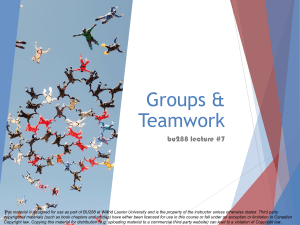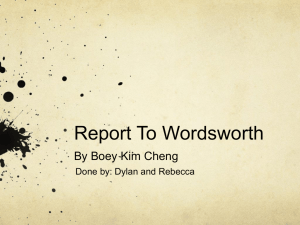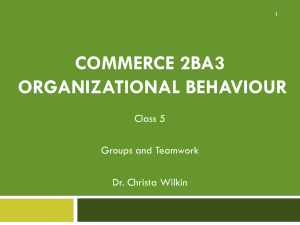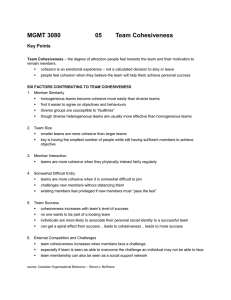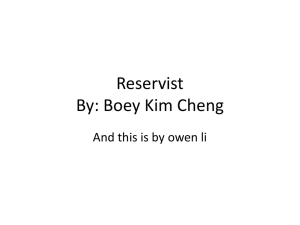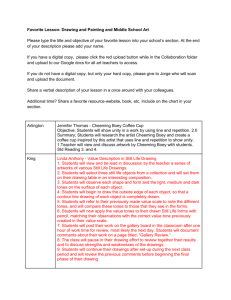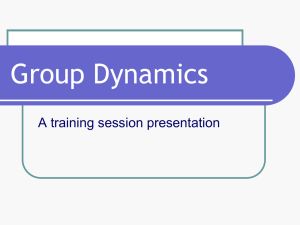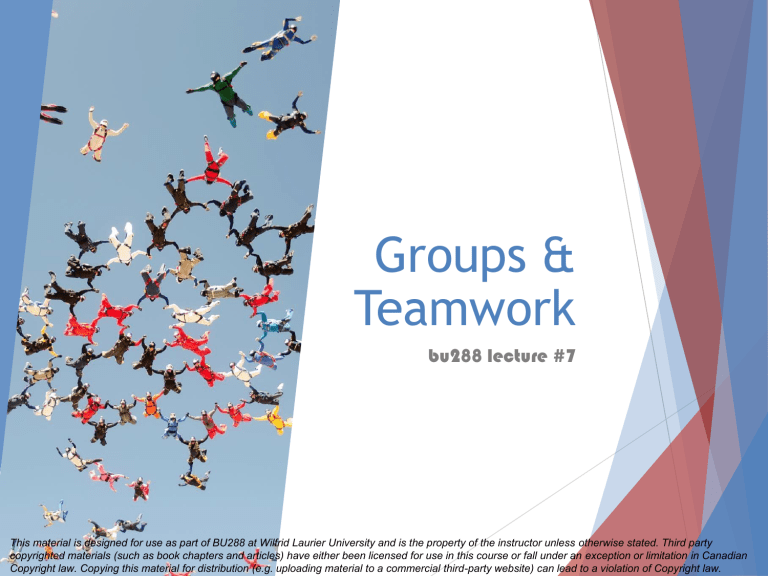
Groups & Teamwork bu288 lecture #7 This material is designed for use as part of BU288 at Wilfrid Laurier University and is the property of the instructor unless otherwise stated. Third party copyrighted materials (such as book chapters and articles) have either been licensed for use in this course or fall under an exception or limitation in Canadian Copyright law. Copying this material for distribution (e.g. uploading material to a commercial third-party website) can lead to a violation of Copyright law. 1) Group Diversity 2) Group Cohesiveness 3) Group Development 4) When Bad Things Happen To Good Teams A.Boey 2 G r o u p s & Te a m w o r k What’s new today Do teams that are more diverse (made up of people from different backgrounds) perform better than teams that are more homogeneous? A.Boey 3 G r o u p s & Te a m w o r k Group Diversity What is cohesiveness? 凝聚⼒是什么? 成员的程度 想成为群体的⼀员 凝聚⼒和有效性: A.Boey 凝聚⼒不是⼀样的效果 通常,有凝聚⼒的团队将会更加成功 但凝聚⼒不是⼀样的效果 The degree to which members really want to be part of the group Cohesiveness and effectiveness: Cohesiveness is not the same thing as effectiveness Typically, cohesive teams will be more successful But, cohesiveness is not the same thing as effectiveness A.Boey 4 G r o u p s & Te a m w o r k Group Cohesiveness Which team will be more COHESIVE? A.Boey Team that faces an external threat VS Team that does not face an external threat Team that experiences a lot of success VS Team that experiences moderate success Team where members are very similar (homogeneous) VS Team that has very diverse membership Team with few members VS Team with many members Team that is exclusive and very difficult to join VS Team that is easy to 5 join G r o u p s & Te a m w o r k Group Cohesiveness Do managers want cohesive groups? A.Boey 6 G r o u p s & Te a m w o r k Group Cohesiveness How do groups develop and change over time? Two Models: Stages Model More likely when group members do not know one another Punctuated Equilibrium Model More likely when the group has a deadline A.Boey 7 G r o u p s & Te a m w o r k Group Development Stages of Group Development 每个阶段都向成员们提出了⼀系列的挑战,他们必须掌握,以实现下⼀个阶段 并⾮所有团体经历这些阶段 过程主要适⽤于新的组织 之前从未⻅过 Each stage presents the members with a series of challenges they must master to achieve the next stage Not all groups go through these stages The process applies mainly to new groups that have never met before Forming Storming Norming Performing Adjourning Time A.Boey 8 G r o u p s & Te a m w o r k Stages Model The approach adopted at the midpoint is carried out The same initial strategy is used throughout the project. The group adopts the tone, norms and approach of the first meeting, whether A.Boey ideal or not The group realizes, “We’ve got to get going!” and if will be more successful if they reevaluate and change their strategy 9 G r o u p s & Te a m w o r k Punctuated Equilibrium Model “The team was really struggling. They kept tweaking their approach but felt like they couldn’t really get a handle on what the solution should be. Then, at the halfway point, the team leader called an all-team meeting. Initially, there was a lot of debate, but then the leader went to the white board and starting drawing a diagram. Then, all at once everyone started to see it. “Subsequently, the team "filled the whole board, working feverishly. We solidified things into a precise understanding. There were so many puzzle pieces ... we finally figured out how they all fit together.“” From there, the team refocused around "packaging" the new solution and delegated a new set of assignments to team members to make maximum use of the 15 days remaining until its deadline. The experience rejuvenated team members' commitment to the 10 project. As one put it, " . . . [the midpoint transition] was really Ericksen & Dyer (2004) important because it brought us all together.“” A.Boey G r o u p s & Te a m w o r k A Good Midpoint Transition “The team had been at a standstill for almost three months. Then the team leader called a meeting around the midpoint in another attempt to get the team on track. This, too, failed. At the end of the meeting, the team still had not addressed its talent deficiencies (they group members didn’t have the right skills for the task), nor had it developed a consensus around a new strategy. "We didn't do a good job of defining the deliverables," is the way one team member put it, "It's an indication of product specificity. We need to know what the [solutions] are before we know what we're going to give [the customers]." Another said, "Right now the picture I have is activities without a solid plan." 11 The downward path became apparent after this point. Group members lost any remaining faith that the team Ericksen & Dyer (2004) could pull off the project. A.Boey G r o u p s & Te a m w o r k A Failed Midpoint Transition Task conflict vs. Disagreements among group members related to the content of their decisions. Differences in viewpoints, ideas and opinions about the task. Relationship Conflict Disagreements among team members stemming from interpersonal incompatibilities. Typically includes tension, annoyance and animosity. →Does everyone need to agree on the task and get along? A.Boey 12 G r o u p s & Te a m w o r k Conflicted about Group Conflict Groups generally prefer to avoid conflict But (task) conflict can be helpful How do you encourage conflict? How do you resolve conflict? A.Boey 13 G r o u p s & Te a m w o r k Conflicted about Group Conflict HOW CAN GROUPS REDUCE LOAFING? A.Boey 14 G r o u p s & Te a m w o r k SLACKERS Social Loafing Was this an additive task or a disjunctive task? Performance is dependent on the sum of the performance of individual group members A.Boey Performance is dependent on performance of the most skilled group member 15 G r o u p s & Te a m w o r k Group Activity Is there anyone in your group who didn’t work hard but just rely on others? Social loafing Did you always speak whatever in your mind without thinking how others would judge your opinion? Evaluation apprehension Did you always get a chance to speak your opinion? Production blocking How do these differ between groups with different sizes? G r o u p s & Te a m w o r k Debrief ✓ Make sure you have a good first meeting ✓ When you start your project, have a discussion with all group members present to talk about ideas ✓ ✓ Seek consensus and ensure that everyone gets on the same page Identify the strengths and weaknesses of your group members, and assign tasks accordingly ✓ Make sure everyone has a meaningful role to play G r o u p s & Te a m w o r k Advice for your group project:
